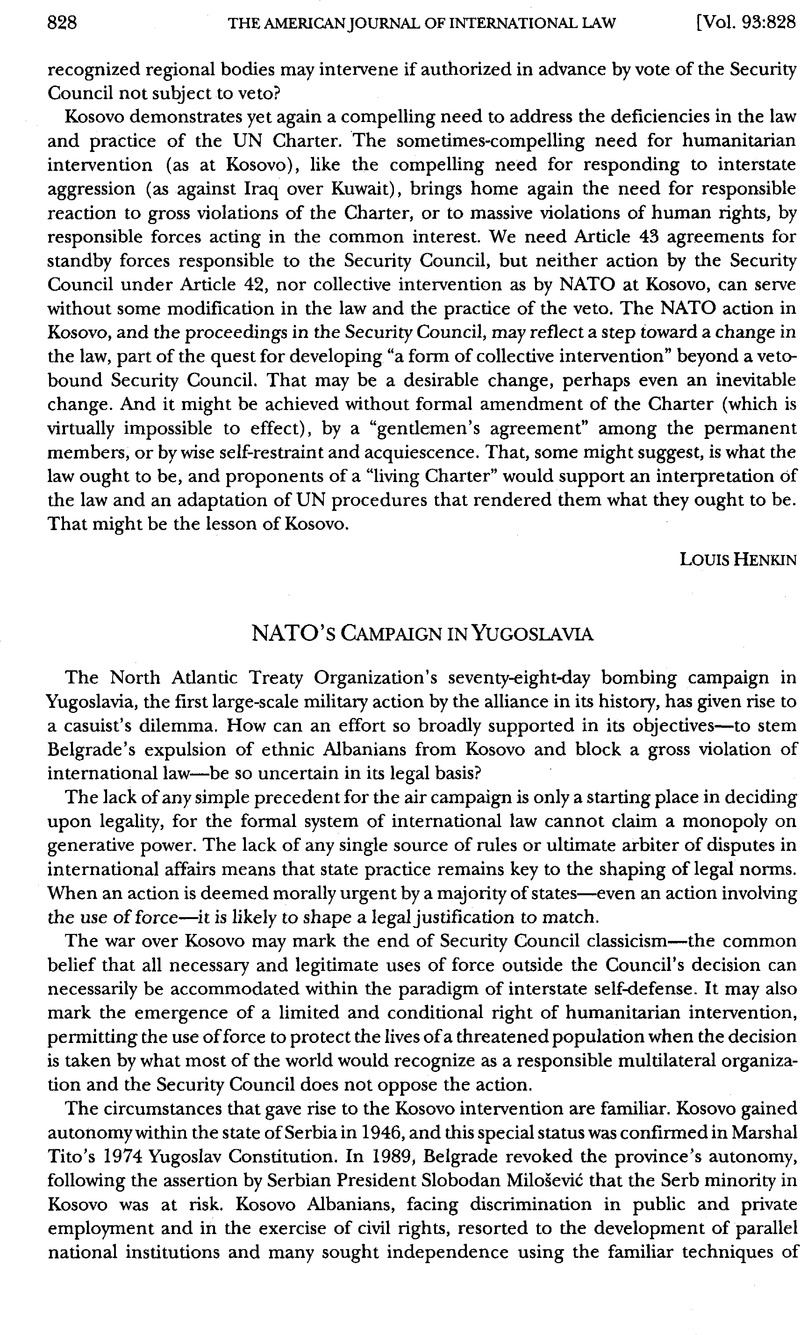Article contents
NATO’s Campaign in Yugoslavia
Published online by Cambridge University Press: 02 March 2017
Abstract

- Type
- Editorial Comments: Nato’s Kosovo Intervention
- Information
- Copyright
- Copyright © American Society of International Law 1999
References
1 Statement by President Bill Clinton Confirming NATO Air Strikes on Serb Military Targets, Fed. News Serv., Mar. 24, 1999; President Clinton Address to the Nation Regarding NATO Air Strikes against Serbia, Fed. News Serv., Mar. 24, 1999. See also Press Statement of Javier Solana, Secretary-General of NATO, NATO Press Release (1999)040 (Mar. 24, 1999) <http://www.nato.int/docu/pr/1999/p99-040e.htm>.
2 See SC Res. 1199, preamble (Sept. 23,1998); SC Res. 1203, preamble (Oct. 24,1998); SC Res. 1244, preamble (June 10, 1999).
3 SC Res. 1160, preamble and paras. 8,16 (Mar. 31, 1998).
4 Id., paras. 4, 5 (emphasis omitted).
5 SC Res. 1199, supra note 2, preamble (emphasis omitted).
6 Id., para. 1.
7 SC Res. 1203, supra note 2, paras. 1, 3.
8 Id., preamble and para. 1.
9 Id., paras. 1,9 (“[e] ndorses” NATO and OSCE agreements with Belgrade for the deployment of verifiers within Kosovo and “affirms that, in the event of an emergency, action may be needed to ensure their safety and freedom of movement”) (emphasis omitted).
10 The Russian Federation said in debate on Resolution 1203 that it “would not condone the use offeree being reflected in a draft and would abstain from the vote.” China stated after the vote that
while its request for deletion of elements authorizing the use offeree or its threat had been accommodated during negotiations on the text, the resolution still contained some elements beyond the agreements reached by the Federal Republic of Yugoslavia and relevant parties, such as invoking Chapter VII of the Charter. Therefore China had abstained from voting.
Security CouncilDemands Federal Republic of Yugoslavia Comply Fully with NATO and OSCE Verification Missions in Kosovo, UN Press Release SC/6588, at 1a (Oct. 24, 1998).
11 SC Res. 1199, supra note 2, preamble (emphasis omitted).
12 SC Res. 1244, supra note 2, para. 7 (emphasis omitted).
13 Id., paras. 10, 11.
14 See Belarus, India, and Russian Federation: Draft Resolution, UN Doc. S/1999/328 (Mar. 26,1999), reprinted in Security Council Rejects Demand for Cessation, of Use of Force against Federal Republic of Yugoslavia, UN Press Release SC/6659 (Mar. 26,1999) [hereinafter Press Release SC/6659].
15 China, Russia and Namibia voted in favor of the resolution. Press Release SC/6659, supra note 14.
16 Cf. UN Charter Art. 99; John F. Murphy, Force and Arms, in 1 United Nations Legal Order 249 (Oscar Schachter & Christopher C.Joyner eds., 1995) (“Certain interpretations or legal opinions by the Secretary-General on the use of force also may carry some weight.”).
17 Secretary-General’s statement on NATO military action against Yugoslavia, M2 Presswire, Mar. 25,1999, available in LEXIS, Market Library, Iacnws File.
18 Id.
19 Id.
20 Secretary-General Presents His Annual Report to General Assembly, UN Press Release SG/SM/7136, GA/9596 (Sept. 20, 1999); see also id.:
To those for whom the greatest threat to the future of international order is the use of force in the absence of a Security Council mandate, one might ask—not in the context of Kosovo—but in the context of Rwanda: If, in those dark days and hours leading up to the genocide, a coalition of States had been prepared to act in defence of the Tutsi population, but did not receive prompt Council authorization, should such a coalition have stood aside and allowed die horror to unfold?
Cf. Statement of Ambassador Danilo Türk, Permanent Representative of Slovenia, in Press Release SC/6659, supra note 14 (Council has “primary, but not exclusive responsibility for maintaining international peace and security”); accord The Charter of the United Nations: A Commentary 234–35 (Bruno Simmaed., 1994); Certain expenses of the United Nations, Advisory Opinion, 1962 ICJ Rep. 151,163 (July 20).
21 Article 53(1) of the UN Charter provides that “no enforcement action shall be taken under regional arrangements or by regional agencies without the authorization of the Security Council.” The United States took die position in the Cuban missile crisis that ex post audiorization was sufficient. Many commentators disputed this reading of the uncertain text, since it suffers the hazard diat Council authorization will not be forthcoming. A choice of interpretation may depend on one’s attitude toward legal ambiguity in international affairs, and relative confidence that a frequendy stymied Council can preserve an adequate framework of security. Compare The Charter of the United Nations, supra note 20, at 734, and Yoram Dinstein, War, Aggression and Self-Defence 286–87 (2d ed. 1994), with Murphy, supra note 16, at 300, and David Wippman, Enforcing the Peace: ECOWAS and the Liberian Civil War, in Enforcing Restraint: Collective Intervention in Internal Conflicts 157, 182 (Lori F. Damrosch ed., 1993).
22 See Jeremy Levitt, Humanitarian Intervention by Regional Actors in International Conflicts, and the Cases of ECOWAS in Liberia and, Sierra Leone, 12 Temple Int’l & Comp. L.J. 333, 347 (1998); Ved Nanda et al., Tragedies in Somalia, Yugoslavia, Haiti, Rwanda, and Liberia—Revisiting the Validity of Humanitarian Intervention under International Law, Part II, 26 Denv. J. Int’l L. & Pol’y 827, 860 (1998); Karsten Nowrot & Emily W. Schabacker, The Use of Force to Restore Democracy: International Legal Implications ofthe ECOWAS Intervention in Sierra Leone, 14 Am. U. Int’l L. Rev. 321 (1998); and Wippman, supra note 21, at 185–86.
23 Statement of Ambassador Danilo Türk, in Press Release SC/6659, supra note 14.
24 For general surveys, see Sean D. Murphy, Humanitarian Intervention: The United Nations in an Evolving World Order (1996); Humanitarian Intervention and the United Nations (Richard B. Lillich ed., 1973).
25 Compare UN Charter Art. 106.
26 See Declaration on the “Guidelines on the Recognition of New States in Eastern Europe and in the Soviet Union,” Dec. 16, 1991, 31 ILM 1485, 1486 (1992).
27 Secretary-General Presents His Annual Report to General Assembly, supra note 20.
- 29
- Cited by


